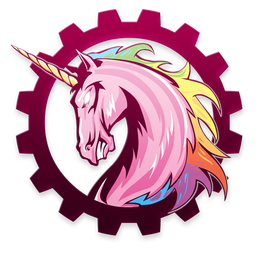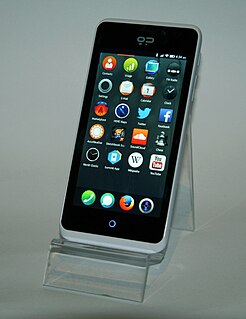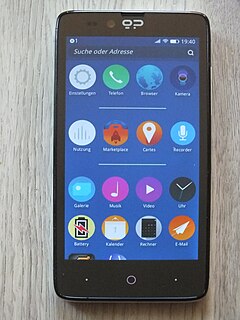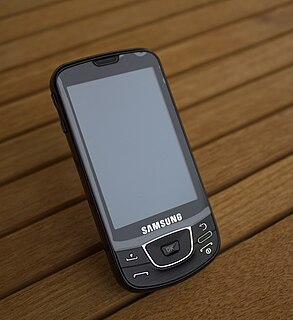 W
WThe Alcatel One Touch Fire is one of the first generation of smartphones preinstalled with Firefox OS, an open-source mobile operating system developed by Mozilla.
 W
WAliOS is a Linux distribution developed by Alibaba Cloud, a subsidiary of Chinese company Alibaba Group. It is designed for smart devices such as smart TVs and it has been used as a mobile operating system. It is an operating system based on the Android Open Source Project (AOSP).
 W
WAndroid is a mobile operating system based on a modified version of the Linux kernel and other open source software, designed primarily for touchscreen mobile devices such as smartphones and tablets. Android is developed by a consortium of developers known as the Open Handset Alliance and commercially sponsored by Google. It was unveiled in November 2007, with the first commercial Android device launched in September 2008.
 W
WAndroid software development is the process by which applications are created for devices running the Android operating system. Google states that "Android apps can be written using Kotlin, Java, and C++ languages" using the Android software development kit (SDK), while using other languages is also possible. All non-JVM languages, such as Go, JavaScript, C, C++ or assembly, need the help of JVM language code, that may be supplied by tools, likely with restricted API support. Some programming languages and tools allow cross-platform app support. Third party tools, development environments, and language support have also continued to evolve and expand since the initial SDK was released in 2008. The official Android app distribution mechanism to end users is Google Play; it also allows staged gradual app release, as well as distribution of pre-release app versions to testers.
 W
WAOKP, short for Android Open Kang Project, is an open-source replacement distribution for smartphones and tablet computers based on the Android mobile operating system. The name is a play on the word kang and AOSP. The name was a joke, but it stuck. It was started as free and open-source software by Roman Birg based on the official releases of Android Open Source Project by Google, with added original and third-party code, features, and control.
 W
WCopperheadOS is a proprietary mobile operating system for smartphones, based on the Android mobile platform. It adds privacy and security features to the official releases of the Android Open Source Project by Google.
 W
WCyanogenMod is a discontinued open-source operating system for mobile devices, based on the Android mobile platform. It was developed as free and open-source software based on the official releases of Android by Google, with added original and third-party code, and based on a rolling release development model. Although only a subset of total CyanogenMod users elected to report their use of the firmware, on 23 March 2015, some reports indicated that over 50 million people ran CyanogenMod on their phones. It was also frequently used as a starting point by developers of other ROMs.
 W
WAmazon Fire OS is a mobile operating system based on Android and created by Amazon for its Fire Phone and Fire brand of tablets, Echo, and other content delivery devices like Fire TV. It is forked from the open source Android operating system and includes proprietary software, customized user interface primarily centered on content consumption, and heavy ties to content available from Amazon's own storefronts and services.
 W
WFirefox OS is a discontinued open-source operating system – made for smartphones, tablet computers and smart TVs – designed by Mozilla and external contributors. It is based on the rendering engine of the Firefox web browser, Gecko, and on the Linux kernel. It was first commercially released in 2013.
 W
WThe GeeksPhone Keon is an entry-level smartphone released by GeeksPhone in April 2013. It is intended for software developers wanting to build and test mobile applications on the new Firefox OS, not for general consumers.
 W
WThe GeeksPhone Peak is a low-end smartphone released by GeeksPhone in April 2013. It is intended for software developers wanting to build and test mobile applications on the new Firefox OS, not for general consumers.
 W
WThe GeeksPhone Revolution is a smartphone released by GeeksPhone in January 2014. It uses the x86 architecture and PCI bus instead of the ARM architecture. It is capable of running either Android or Firefox OS, but lacks a dual boot facility.
 W
WHive is a custom ROM developed by Xolo and is built on the Android operating system v 4.4.4 (Kitkat). Hive is exclusive to Xolo devices and is not licensed to third-parties.
 W
WKaiOS is a mobile operating system based on Linux, developed by KaiOS Technologies Limited, a company based in Kowloon, Hong Kong, for keypad devices with largest shareholder being Chinese multinational electronics conglomerate TCL Corporation. It is forked from B2G OS, an open source community-driven fork of Firefox OS, which was discontinued by Mozilla in 2016.
 W
WLibrem 5 is a smartphone manufactured by Purism that is part of their Librem line of products. The phone is designed with the goal of using free software whenever possible, and it runs on PureOS, a Linux operating system.
 W
WLuneOS is a mobile operating system (OS) based on the Linux kernel and currently developed by WebOS Ports community. With a user interface based on direct manipulation, LuneOS is designed primarily for touchscreen mobile devices such as smartphones and tablet computers. The OS uses touch inputs that loosely correspond to real-world actions, like swiping, tapping, pinching, and reverse pinching to manipulate on-screen objects, and a virtual keyboard.
 W
WMaliit is an input method framework for computers with particular focus on implementing virtual keyboards. Designed mostly for touchscreen devices, Maliit allows the inputting of text without the presence of a physical keyboard. More advanced features such as word correction and prediction are also available.
 W
Wmobile Internet device (MID) is a multimediacapable mobile device providing wireless Internet access. They are designed to provide entertainment, information and location-based services for personal or business use. They allow 2-way communication and real-time sharing. They have been described as filling a niche between smartphones and tablet computers.
 W
WMoblin, short for 'mobile Linux', is a discontinued open source operating system and application stack for Mobile Internet Devices (MIDs), netbooks, nettops and embedded devices.
 W
WThe Nokia N900 is a smartphone made by Nokia. It supersedes the Nokia N810. Its default operating system, Maemo 5, is a Linux-based OS originally developed for the Nokia 770 Internet Tablet. It is the first Nokia device based upon the Texas Instruments OMAP3 microprocessor with the ARM Cortex-A8 core. Unlike the three Nokia Internet tablets preceding it, the Nokia N900 is the first Maemo device to include phone functionality.
 W
WOmniROM is an open-source operating system for smartphones and tablet computers, based on the Android mobile platform. It involves a number of prominent developers from other projects.
 W
WThis is a list of mobile phones with open-source operating systems.
 W
WThe PinePhone is a smartphone, developed by computer manufacturer Pine64, intended for allowing the user to have full control over the device. Measures to ensure this are running mainline Linux based mobile operating systems, assembling the phone with screws, so that it can be easily disassembled for repairs and upgrades, and including six kill switches / security switches for its hardware, which are accessible by removing the back cover of the phone.
 W
WPureOS is a Linux distribution focusing on privacy and security, using the GNOME desktop environment. It is maintained by Purism for use in the company's Librem laptop computers as well as the Librem 5 smartphone.
 W
WReplicant is a free operating system (OS) based on the Android mobile platform that aims to replace all proprietary Android components with free-software counterparts. It is available for several smartphones and tablet computers. It is written in the same programming languages as Android. The modifications are mostly in the C language; the changes are mostly to the lower-level parts of the OS, such as the Linux kernel and drivers that use it.
 W
WSailfish OS is a Linux-based operating system based on open source projects such as Mer and including a closed source UI. The project is being developed by the Finnish company Jolla.
 W
WThe Samsung GT-I7500 Galaxy is a smartphone manufactured by Samsung that uses the open source Android operating system. It was announced on 27 April 2009 and was released on 29 June 2009 as the first Android-powered device from Samsung Mobile, and the first in what would become the long Galaxy series. It is succeeded by the Samsung GT-I5700 Galaxy Spica.
 W
WTizen is a Linux-based mobile operating system backed by the Linux Foundation but developed and used primarily by Samsung Electronics.
 W
WThe Tizen Association is a non-profit technology consortium organization dedicated to creating Tizen as the first truly open, hardware-independent, Linux-based mobile operating system for smartphone mobile devices. The mission of the LiMo Foundation is to create an open, Linux-based software platform for use by industry to produce mobile devices through a balanced and transparent contribution process, enabling an ecosystem of differentiated products, applications and services. The governance is "open and transparent": leadership and decision making are shared. The founding members were Motorola, NEC, NTT DoCoMo, Panasonic Mobile Communications, Samsung Electronics, and Vodafone. The work result was the LiMo Platform. The work was integrated into mobile phone products from NEC, Panasonic and Samsung and later combined in the Tizen platform.
 W
WUbuntu Touch is a mobile version of the Ubuntu operating system, being developed by the UBports community. Its user interface is written in Qt, and is designed primarily for touchscreen mobile devices such as smartphones and tablet computers, but the original goal of convergence was intended to bring Ubuntu Touch to laptops, desktops, IOT devices, TVs and smart watches for a complete unified user experience.
 W
WwebOS, also known as LG webOS and previously known as Open webOS, HP webOS and Palm webOS, is a Linux kernel-based multitasking operating system for smart devices such as smart TVs that has also been used as a mobile operating system. Initially developed by Palm, Inc., HP made the platform open source, at which point it became Open webOS.